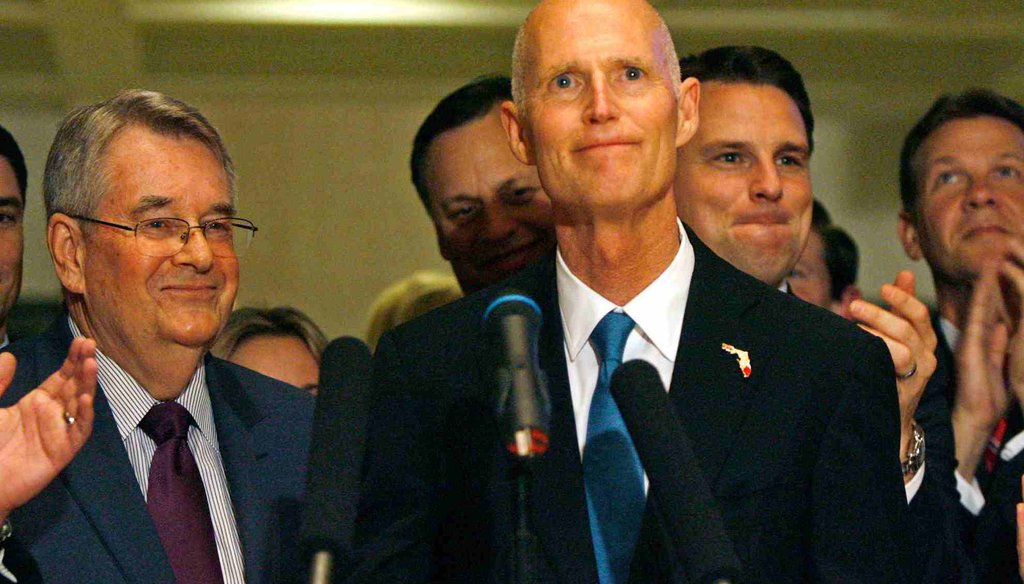Stand up for the facts!
Our only agenda is to publish the truth so you can be an informed participant in democracy.
We need your help.
I would like to contribute

How has Rick Scott done on his 2010 campaign promises? (Tampa Bay Times photo by Scott Keeler)
Gov. Rick Scott has had nearly four years to enact the agenda he promised as a candidate back in 2010: a relentless focus on jobs, a downsizing of government and a hard line on illegal immigration.
PolitiFact Florida has tracked 57 of his campaign promises over four years and found a mixed report. Scott is certainly trying on job creation. He’s succeeded in shrinking government. But he has largely reversed himself on immigration.
Out of 57 promises, PolitiFact Florida has rated 24 Promise Kept, 15 Promise Broken and 11 Compromise. Another five are In the Works and two are Stalled.
PolitiFact rates promises based on outcomes, not intentions, so a promise not achieved is rated Promise Broken. The aim of PolitiFact’s promise meter is to compare campaign rhetoric with what actually happens after a candidate takes office.
Scott’s most notable promises were about jobs, and he pledged to create 700,000 above and beyond Florida’s natural growth. Florida’s jobs numbers are up, but economists say people should credit a natural recovery more than Scott’s specific actions. Meanwhile, Scott has kept his pledges to reduce the government workforce and oppose new taxes.
On the other hand, Scott abandoned promises to get tough on illegal immigration. And in a few cases, Scott made promises that simply weren’t realistic — such as massive cuts in the state prison budget. These examples seem to be pledges from a political novice who came up against the reality of governing.
"It’s not unusual for politicians to over-promise," said Kevin Wagner, associate professor of political science at Florida Atlantic University. "Candidates are better evaluated by what they have actually prioritized and done while in office."
Coming up short
During the 2010 campaign, Scott vowed to cut $1 billion out of a $2.39 billion prison budget — a 42 percent nosedive.
People who know the state budget said it could only be achieved by closing prisons and releasing thousands of prisoners early. In the end, the state prison budget dropped by about $90 million, a fraction of what Scott had promised. We rated his pledge to cut $1 billion Promise Broken.
Other promises hit roadblocks when the other branches of government — the state Legislature or the courts — refused to go along with Scott’s ideas. One example: Scott’s plans to drug test people on welfare.
The Legislature agreed in 2011 to require drug testing for Floridians who receive cash welfare assistance. But courts have said such testing is unconstitutional, and the American Civil Liberties Union of Florida filed suit. Judges have continued to reject Scott’s plan, leading us to rate it Promise Broken. (The state is still pursuing the case, and a federal court will hear oral arguments in November.)
In some cases, Scott seems to have simply abandoned promises, especially ones made during a rough 2010 GOP primary against then-Attorney General Bill McCollum as he tried to appeal to the conservative base.
Scott vowed to bring an Arizona-style immigration law to Florida (requiring local police to verify immigration status) and to require that all employers use an E-verify system in hiring. Neither law has come to pass, and Scott has talked little about the ideas since he was elected. PolitiFact Florida rated both promises Promise Broken.
Scott also reversed himself on opposing an expansion of Medicaid, the health insurance program for the very poor. During the campaign, Scott pledged to work against the health care law, which included Medicaid expansion. But in early 2013, Scott came out strongly in favor of accepting federal money to insure nearly 1 million poor Floridians.
The Legislature refused the expansion, but it was a notable change of position for Scott, who otherwise actively opposed the law. We rated his promise to fight for a repeal of the health care law a Compromise.
Fulfilling his goals
One thing Scott has never stopped talking about from his 2010 campaign: job creation. Scott ran on a platform of lifting the state out of the Great Recession, touting a seven-year, seven-step plan to create 700,000 jobs.
Not all of his recommendations were implemented. For example, the corporate income tax was reduced, not eliminated, earning a rating of Stalled. But the state has marched steadily toward his goals nonetheless.
An enduring debate is over how many jobs Scott actually promised. Economists predicted the state would add 1 million jobs anyway, no matter who was in the Governor’s Mansion. On the campaign trail in 2010, Scott said his 700,000 would be in addition to those 1 million, despite the fact there were only 1 million out-of-work Floridians.
He later backed off that 1.7 million promise, saying his plan focused only on creating 700,000 new, private-sector jobs. "I don’t know who said that," he said when asked about the 1.7 million number. "I have no idea."
In any event, the state has been adding jobs, although many have been low-paying retail or service industry jobs. As of July 2014, Florida had added 594,900 new jobs since Scott took office. That’s less than what the governor’s office is counting, 620,300 jobs, because they are not factoring in a drop in government employment. Because he has seven years to reach his goal, we continue to rate this promise In The Works.
Whether Scott can take credit for growth that was largely predicted to happen anyway is a matter of politics, said Sean Snaith, director of the Institute for Economic Competitiveness at the University of Central Florida.
"The governor was elected as the state was recovering from the recession," Snaith said. "That didn’t hurt."
Scott has been governor while the state has seen a steady inflow of new retirees and a housing market getting back on its feet. Both of those are always big drivers of the state’s economy, Snaith said.
"It’s like a buffet," he said. " 'All these things were because of me, and all the bad things were the last guy’s fault.’ "
Scott’s 7-7-7 plan also touted increases in three other economic indicators: an additional $74 billion in state gross domestic product, $41 billion in higher personal income and $1 billion in total state tax revenues.
The state’s GDP rose from $728.6 billion in 2010 to $800.5 billion in the first quarter of 2014, the most recent statistic available. That’s a difference of $71.9 billion, very close to Scott’s prediction, and with another three years to go.
Because of the upswing in jobs, personal income also rose during the same period we measured GDP. That rise from $738.7 billion to $835.4 billion is a $96.7 billion change, more than twice what Scott wanted.
Tax revenues are trickier, since there’s no indication of how Scott was measuring collections, but our research into the state and federal records showed a hike somewhere between $3.8 billion and $4.1 billion, also quite higher than what Scott’s plan called for.
Scott’s 7-7-7 plan said it would run for seven years, so we didn’t rule on final numbers, but those last three economic indicators look good for Scott. We rated that promise In The Works.
No new taxes
Another of Scott’s goals has been lowering spending and shrinking government, and on these promises Scott has largely delivered, especially since he had cooperation from the Legislature.
Our own review found no serious attempts by the Legislature to raise taxes on Floridians during any session, despite facing years with budget deficits. We rated his promise to oppose tax increases a Promise Kept.
"It’s been easy, if you will, because the Legislature hasn’t raised taxes," said Dominic Calabro, president and CEO of Florida TaxWatch, a business-backed institute focused on tax issues. "I haven’t seen a case where he hasn’t followed through."
Scott has also significantly reduced the number of government employees. While there are different ways to count the state workforce, they all show the same trend of fewer state workers. We looked at the number of positions authorized and funded by the state budget and found the workforce declined from 126,728 the year before Scott took office to 114,444 in the most recent budget year. That’s a decline of 9.6 percent. For his promise to reduce government employees, Scott earned a Promise Kept.
Darryl Paulson, a political science professor emeritus at the University of South Florida, said voters don’t expect politicians to deliver on all of their promises but expect them to deliver on major promises. And the jobs picture for Florida is better than it was.
"Scott’s big promise was on creating jobs and improving the economy. Although there may be differences about how much of the promise he kept and how much credit Scott should get for the improving Florida economy, many voters believe we are now in a better place economically, and Scott will benefit."
Read individual reports on all 57 of Gov. Rick Scott’s 2010 campaign promises. Contact PolitiFact Florida at [email protected] or @PolitiFactFL
Our Sources
See individual promises for sources.


































